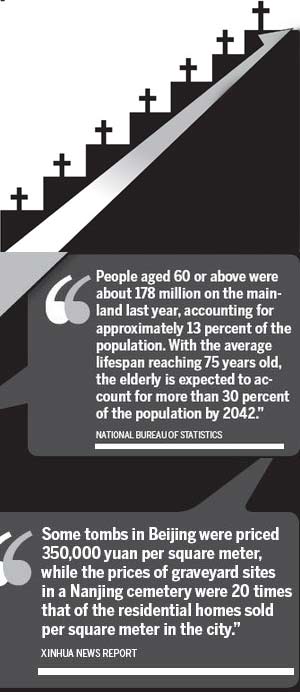
People nowadays can't even afford to die, as some tomb prices in Beijing cost as much as 350,000 yuan per sq m. 'Building homes for the dead' offers so high profit margins that many companies are rushing to this sector, Li Tao reports.

While most mainland people feel vulnerable to surging home prices these days, they also realize that it is also becoming unaffordable to die these days - due to the rocketing tomb and cemetery prices.
But some like Wang Yi, 52, is proud of her foresight.
In 2007, Wang, supported by her husband, decided to purchase graveyard sites for her parents-in-law, her parents, and themselves despite all of them having good health.
After making several personal field trips, Wang eventually spotted a large private cemetery located in Suzhou, which has mountains in the background and faces the Taihu Lake - deemed by Wang as having "very good fung shui".
Without much ado, Wang bought a "standard-sized" graveyard site for her parents - a two-square-meter tumulus that is designed for a pair of cinerary caskets, at a cost of 25,000 yuan. She bought another bigger graveyard site to rest Wang's parents-in-law, including her husband, who is the only son in the parent's family, and herself. The investment cost the couple another 70,000 yuan.
"The prices of graves in the same cemetery have at least doubled these days," Wang told China Daily five years after she sealed the deal. "Good locations have also become scarce after years of development," she added.
The doubling of grave prices and scarcity of good locations were confirmed by Andy Chui, chairman of Sage International Group, a Hong Kong-listed company which is involved in the operation of the cemetery and funeral services in both Hong Kong and the mainland.
"Tomb prices are now costing an average of 25,000 yuan per square meter in Suzhou. In Shanghai, it even reaches 50,000 yuan per square meter," said Chui.
According to data released by the mainland property advisory firm SouFun Holdings Ltd in July, average home prices in Suzhou and Shanghai averaged 11,450 yuan and 23,113 yuan per square meter, respectively.
Even in Shenzhen where residential properties are the most expensive on the mainland, the 24,550 yuan per square meter average selling prices are much lower than the average tomb prices in Suzhou.
According to a Xinhua news report in April, some tombs in Beijing were priced 350,000 yuan per square meter, while the prices of graveyard sites in a Nanjing cemetery were 20 times that of the residential homes sold per square meter in the city.
Cemetery developments in China mushroomed during the years along with the booming residential construction, which underwent tremendous expansion in both the quantities and selling prices given the buoyant demand. The increasing aging population on the mainland has resulted in a booming demand for "good places to rest" after death.
Data from the National Bureau of Statistics showed that people aged 60 or above were about 178 million on the mainland last year, accounting for approximately 13 percent of the population. With the average lifespan reaching 75 years old, the elderly is expected to account for more than 30 percent of the population by 2042.
Howard Wong, head of research from Kingsway Financial Services Group in Hong Kong, attributed the hotspot cemetery market to the explicit demand in China based on the traditional concept of being "buried and to rest" in peace. The boom is also assisted by the fast growing wealth among the population.
"Chinese people are willing to spend money on funerals and tombs. It is hard to say if the current prices are too high given that the demands are even higher," said Wong.
 Market flat, Japan-brand sales plummet
Market flat, Japan-brand sales plummet China initiates new exporter review for Nissan
China initiates new exporter review for Nissan Toyota not to close China factories
Toyota not to close China factories Audi: Local models, not price cuts, hold the key
Audi: Local models, not price cuts, hold the key